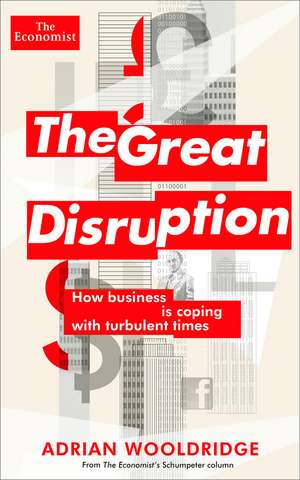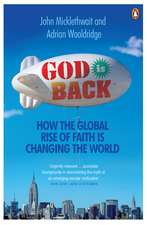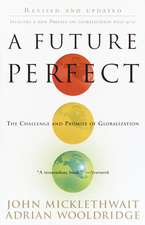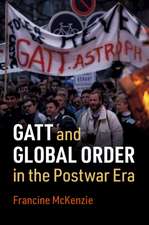The Great Disruption: How business is coping with turbulent times: Economist Books
Autor The Economist, Adrian Wooldridgeen Limba Engleză Paperback – iun 2015
The Great Disruption is a collection drawn from Adrian Wooldridge's influential Schumpeter columns in The Economist addressing the causes and profound consequences of the unprecedented disruption of business over the past five years.
The Great Disruption has many causes. The internet is spreading faster than any previous technology. Emerging markets are challenging the west's dominance of innovation as well as manufacturing. Clever management techniques such as “frugal innovation” are forcing companies to rethink pricing. Robots are advancing from the factory floor into the service sector. But these developments are all combining together to shake business life—and indeed life in general—to its foundations.
The Great Disruption is producing a new class of winners, many of whom are still unfamiliar: Asian has more female billionaires and CEOs than Europe, for example. It is also producing a growing class of losers: old-fashioned universities that want to continue to operate in the world of talk and chalk; companies that refuse to acknowledge that competition is now at warp speed; and business people who think that we still live in the world of company man. It is forcing everybody to adapt or die: workers realise that they will have to jump from job to job—and indeed from career to career—and institutions realise that they need to remain adaptable and flexible.
The Great Disruption is all the more testing because it coincides with the Great Stagnation. The financial crisis has not only reduced most people's living standards in the west. It has also revealed that the boom years of 2000-20007 were built on credit: individuals and governments were borrowing money to pay for lifestyles that no longer had any real justification. Employees are having to cope with unprecedented change at a time when they are also seeing their incomes flat or declining. Companies are having to respond to revolutionary innovations even as they are seeing their overall markets contract. We are all having to run faster in order to stay in the same place.
This book begins with a long introduction explaining the thesis of the book and setting it in a broad historical context. It will also introduce readers to Joseph Schumpeter and explain why his ideas about creative destruction are particularly valuable today.
The Great Disruption has many causes. The internet is spreading faster than any previous technology. Emerging markets are challenging the west's dominance of innovation as well as manufacturing. Clever management techniques such as “frugal innovation” are forcing companies to rethink pricing. Robots are advancing from the factory floor into the service sector. But these developments are all combining together to shake business life—and indeed life in general—to its foundations.
The Great Disruption is producing a new class of winners, many of whom are still unfamiliar: Asian has more female billionaires and CEOs than Europe, for example. It is also producing a growing class of losers: old-fashioned universities that want to continue to operate in the world of talk and chalk; companies that refuse to acknowledge that competition is now at warp speed; and business people who think that we still live in the world of company man. It is forcing everybody to adapt or die: workers realise that they will have to jump from job to job—and indeed from career to career—and institutions realise that they need to remain adaptable and flexible.
The Great Disruption is all the more testing because it coincides with the Great Stagnation. The financial crisis has not only reduced most people's living standards in the west. It has also revealed that the boom years of 2000-20007 were built on credit: individuals and governments were borrowing money to pay for lifestyles that no longer had any real justification. Employees are having to cope with unprecedented change at a time when they are also seeing their incomes flat or declining. Companies are having to respond to revolutionary innovations even as they are seeing their overall markets contract. We are all having to run faster in order to stay in the same place.
This book begins with a long introduction explaining the thesis of the book and setting it in a broad historical context. It will also introduce readers to Joseph Schumpeter and explain why his ideas about creative destruction are particularly valuable today.
Preț: 117.45 lei
Nou
Puncte Express: 176
Preț estimativ în valută:
22.48€ • 23.38$ • 18.56£
22.48€ • 23.38$ • 18.56£
Carte disponibilă
Livrare economică 24 martie-07 aprilie
Preluare comenzi: 021 569.72.76
Specificații
ISBN-13: 9781610395076
ISBN-10: 1610395077
Pagini: 304
Ilustrații: charts and grafs throughout
Dimensiuni: 216 x 140 x 22 mm
Greutate: 0.27 kg
Ediția:First Trade Paper Edition
Editura: PublicAffairs
Colecția The Economist
Seria Economist Books
ISBN-10: 1610395077
Pagini: 304
Ilustrații: charts and grafs throughout
Dimensiuni: 216 x 140 x 22 mm
Greutate: 0.27 kg
Ediția:First Trade Paper Edition
Editura: PublicAffairs
Colecția The Economist
Seria Economist Books
Notă biografică
Adrian Wooldridge is The Economist's management editor and writes the Schumpeter column. He was previously based in Washington, DC, as the Washington bureau chief where he also wrote the Lexington column. Previously he has been The Economist's West Coast correspondent, management correspondent and Britain correspondent. He is the co-author of The Company: A Short History of a Revolutionary Idea, A Future Perfect: The Challenge and Hidden Promise of Globalisation, Witch Doctors, a critical examination of management theory, and The Right Nation, a study of conservatism in America. His most recent book is Masters of Management: How the Business Gurus and their Ideas have Changed the World—for Better and for Worse.























